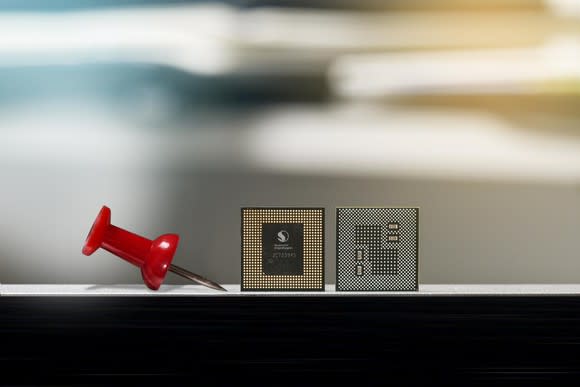Qualcomm's Fingerprint Scanner Business May Have Scored a Significant Win
For a while now, there's been plenty of talk about smartphone vendors adopting in-display fingerprint sensors as a way to increase the screen-to-body ratio of premium smartphones.
Back in June of 2017, smartphone-chip giant Qualcomm (NASDAQ: QCOM) announced its Qualcomm Fingerprint Sensor for Display, referring to it as "the mobile industry's first commercially announced multi-functional ultrasonic solution capable of scanning through OLED display stacks of up to [1,200 micrometers]."

Image source: Qualcomm.
In a June 2017 presentation going over its fingerprint sensor portfolio, Qualcomm said it expected to provide commercial samples of its Fingerprint Sensor for Display in "early 2018," with commercial devices "expected to arrive in Summer of 2018."
Interestingly, according to ETnews (via Tom's Guide), Qualcomm may have scored a sizable win for its Fingerprint Sensor for Display technology: Samsung (NASDAQOTH: SSNLF).
Boosting content in Samsung's flagship
Qualcomm is already a key supplier of applications processors and related chips into Samsung's flagship Galaxy S-series and Note-series smartphones. According to a teardown report from iFixit of the Samsung Galaxy S9 smartphone, the following Qualcomm chips are inside the device:
A Snapdragon 845 applications processor
An Aqstic WCD9341 audio codec
A PM845 chip that iFixit says is "likely [a] PMIC" (power management integrated circuit)
An SDR845 RF transceiver
A PM8005 PMIC
Now, while Qualcomm does appear to provide a robust amount of chip content in Samsung's flagship smartphones, investors need to remember that Samsung tends to build two variants of its flagships: one with a Qualcomm applications processor and one with a Samsung-designed applications processor.
The ones with the Samsung applications processors tend not to have the complementary chips (such as audio codec, RF transceiver, and PMIC chips) sourced from Qualcomm.
If it's true that Qualcomm will be supplying an in-display fingerprint scanner into the upcoming Galaxy S10 smartphones, this would represent a rather high-volume win for the company's fingerprint-scanning business.
One thing to keep in mind, though, is that XDA Developers recently reported that Samsung is planning no fewer than four distinct Galaxy S10 products, and the lowest-end model is set to have a "side-mounted fingerprint scanner" -- in other words, it won't use Qualcomm's in-display fingerprint scanning solution.
Nevertheless, supplying in-display fingerprint scanners into most of Samsung's upcoming Galaxy S10 family is still a nice win.
Taking the bigger-picture view
The reality that both smartphone makers and component suppliers have to face is that the overall smartphone market just isn't seeing the kinds of unit growth that it once did. In fact, market-research company IDC predicted back in May that overall smartphone shipments would drop by 0.2% in 2018, and that such shipments would see a meager 2.5% compound annual growth rate from 2017 to 2022.
It's clear that neither smartphone makers nor their suppliers can rely on unit shipment growth alone to deliver solid growth to their shareholders. By offering products like fingerprint scanners to smartphone makers, Qualcomm is trying to increase the amount of revenue it generates per smartphone, to help it outpace the anemic growth in the smartphone market.
Winning the in-display fingerprint-scanning spot in the upcoming Galaxy S10 smartphones could serve to significantly bolster Qualcomm's credibility in this niche, potentially allowing it to win more business with other premium smartphone makers.
More From The Motley Fool
Ashraf Eassa owns shares of Qualcomm. The Motley Fool owns shares of Qualcomm. The Motley Fool has a disclosure policy.

 Yahoo Finance
Yahoo Finance 